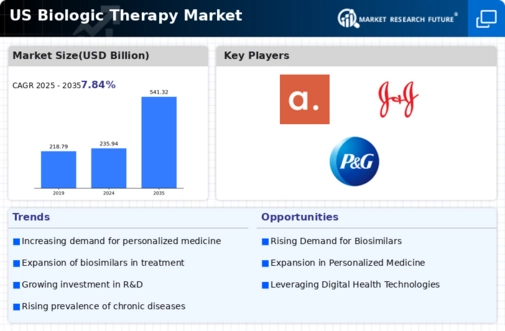US Cancer Biologic Therapy Market Summary
The US Biologic Therapy market is projected to experience substantial growth from 235.94 USD Billion in 2024 to 541.32 USD Billion by 2035.
Key Market Trends & Highlights
US Biologic Therapy Key Trends and Highlights
- The market is expected to grow at a compound annual growth rate of 7.84 percent from 2025 to 2035.
- By 2035, the market valuation is anticipated to reach 541.32 USD Billion, indicating robust expansion.
- In 2024, the market is valued at 235.94 USD Billion, reflecting a solid foundation for future growth.
- Growing adoption of biologic therapies due to increasing prevalence of chronic diseases is a major market driver.
Market Size & Forecast
| 2024 Market Size | 235.94 (USD Billion) |
| 2035 Market Size | 541.32 (USD Billion) |
| CAGR (2025 - 2035) | 7.84% |
Major Players
Biogen, Celgene, Amgen, Pfizer, BristolMyers Squibb, Johnson and Johnson, Roche, Vertex Pharmaceuticals, AbbVie, Eli Lilly and Company, Gilead Sciences, Sanofi, Regeneron Pharmaceuticals, Novartis, Merck and Co













